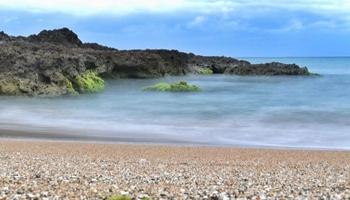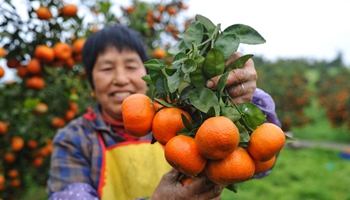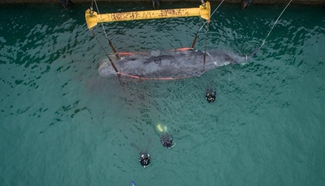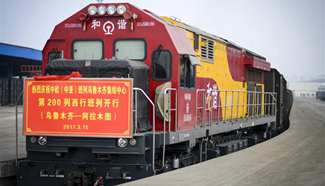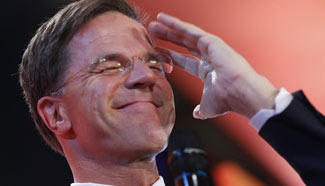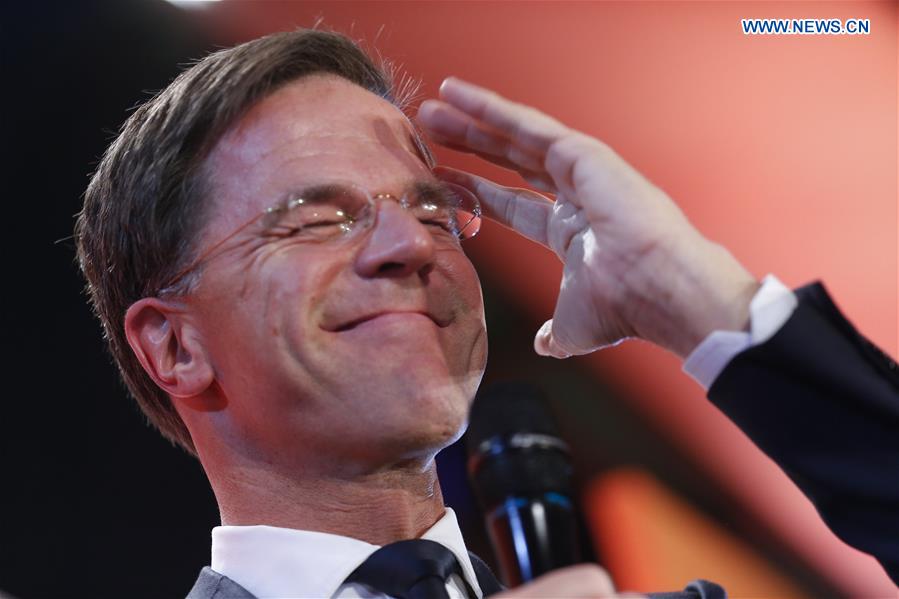
Dutch Prime Minister and People's Party for Freedom and Democracy VVD leader Mark Rutte gestures during election night for his liberal rightist party VVD in The Hague, the Netherlands, on March 15, 2017. The liberal rightist party VVD of Prime Minister Mark Rutte took the lead in the Dutch parliamentary elections, according to the final exit poll released on Wednesday, with the far-right party PVV staying far behind. (Xinhua/Ye Pingfan)
By Maria Vasileiou
THE HAGUE, March 15 (Xinhua) -- The Netherlands decisively rejected the possibility of a European Union (EU) state electing a far-right party, dealing a major blow to the wave of populism sweeping Western countries, Dutch experts say.
"The Dutch vote put an end to the so-called populist spring as the outcome shows that far-right extremism lost its momentum in the Netherlands," said Paul Teule, lecturer of political economics at the University of Amsterdam (UvA).
Dutch Prime Minister Mark Rutte's center-right People's Party for Freedom and Democracy (VVD) came first in the Dutch parliamentary elections, according to the final exit poll released on Wednesday, with the right-wing populist party PVV staying far behind.
"Rutte made a clear victory beating off (PVV leader Geert) Wilders with a substantial difference," said Eddy Habben Jansen, executive director of ProDemos, an organization promoting political and social participation in the Netherlands. "The result of the Dutch elections is a disappointment for those who were expecting a victory for Wilders."
The definite exit poll forecasted the VVD won 31 of the 150 seats in the House of Representatives, or lower house of the parliament ahead of Wilders' PVV which tied in second place with two other parties at 19 seats each.
The Dutch vote was being watched as a barometer of how well populist candidates will do in upcoming elections in Europe and particularly in France and Germany, where right-wing nationalists hope to make a big impact, potentially posing a threat to the EU.
Far-right candidate Marine Le Pen is set to enter France's presidential election run-off in May, while euroskeptic, anti-immigrant Alternative for Germany is likely to enter the German federal parliament for the first time in federal elections in September.
"Europe can breathe a sigh of relief at the result of the Dutch vote," said Floris Vermeulen, associate professor and chair of the department of political science at the University of Amsterdam (UvA).
"The result dealt a blow to populists who had hoped anti-establishment anger had grown enough to bring them to power across Europe," said Vermeulen.
Wilders had virtually no chance of forming a government given that all the leading parties had ruled out working with him, but a PVV win would still send shockwaves across Europe.
The voters clearly rejected Wilders' extreme radical political line, explained the political expert. "The Dutch vote is a clear sign that if populist parties want to succeed it is not possible with a one page political program, which is limited to a few radical ideas and issues. They should address a larger number of issues and suggest appropriate solutions."
Wilders' one-page election campaign program contained only eleven points with the first and most expansive one focusing on "de-Islamization" of the Netherlands. "Wilders did not succeed in capturing the opportunity, when the issues of integration and immigration were high on the election complain," said Vermeulen.
"Le Pen cannot use the momentum of populism to promote her campaign in France," added the political scientist. In a similar tone, Teule explained that the French far-right candidate for the presidential elections can no longer rely on a favorable vote for Wilders.
"The momentum, which would fit in the narrative of an upcoming populism wave ready to overturn the established political order across Europe and worldwide, is lost," said the Dutch political expert and author of "Vrijheid voor Gevorderden" (Freedom for Advanced Readers), a book on Dutch politics containing a comprehensive rethink of the notion of freedom.
"After the Brexit and Donald Trump winning the U.S. Presidential elections everyone was looking at us," Mark Rutte said at a party meeting in The Hague. "This evening the Dutch people said 'stop' to the wrong kind of populism."
Alexander Pechtold, leader of the Democratic 66 (D66), and GroenLinks leader Jesse Klaver, who are expected to win 19 and 16 votes respectively, used the same words. "The sound of populism has stopped in the Netherlands," said Pechtold. "Populism has not had a breakthrough in the Netherlands," added Klaver.
Jansen of ProDemos echoed the political leaders. "Populism in the Netherlands is nothing like Brexit or Trump," he said. In the aftermath of the Brexit vote and the win of Donald Trump in the U.S. Presidential elections, a victory for the PVV would have been seen as an impending sign of a growing wave of populism through Europe.
"Wilders was almost invisible for a long part of his election campaign," Vermeulen cited as another reason for Wilders' defeat. "Only last week he tried by taking part in debates to gain ground, but the voters did not respond." PVV's result is well down from his 2010 high of 24 seats.
But Teule cautioned about the rise of the minor pro-immigrant party DENK, which is projected to gain three seats. "We see it as the counter party of PVV. A big populist party did not make it to the lead, but a newly formed minor has managed to enter the parliament," he said.
On the other hand, Vermeule warned that French elections would now be the next barometer for how well populist parties will perform in Europe.
Related:
Dutch PM Rutte claims victory in election over "populism"
THE HAGUE, March 16 (Xinhua) -- The Netherlands has said "stop" to the wrong kind of populism, said Dutch Prime Minister Mark Rutte Wednesday evening after exit polls showed his center-right People's Party for Freedom and Democracy (VVD) would keep its position as the biggest party in the parliamentary election.
"It seems that the VVD will be the largest party three times in a row," Rutte told a crowd of cheering supporters in an election night gathering at the World Trade Center in The Hague. Full Story
Spotlight: Dutch people say no to populism, says PM Rutte
THE HAGUE, March 15 (Xinhua) -- The liberal rightist party VVD of Prime Minister Mark Rutte took the lead in the Dutch parliamentary elections, according to the final exit poll released on Wednesday, with the far-right party PVV staying far behind.
The definite exit poll forecasted the VVD got 31 seats of the 150 seats in the House of Representatives, or lower house of the parliament. Full Story
French FM congratulates Dutch for "stemming" rise of far-right
PARIS, March 15 (Xinhua) -- French Foreign Minister Jean-Marc Ayrault congratulated via twitter on Wednesday night the Dutch people for "stemming" the rise fo far-right led by Geert Wilders.
He said on twitter that "Congratulations to the Dutch for stemming the rise of the far-right. Desire to work for a stronger Europe." Full Story




